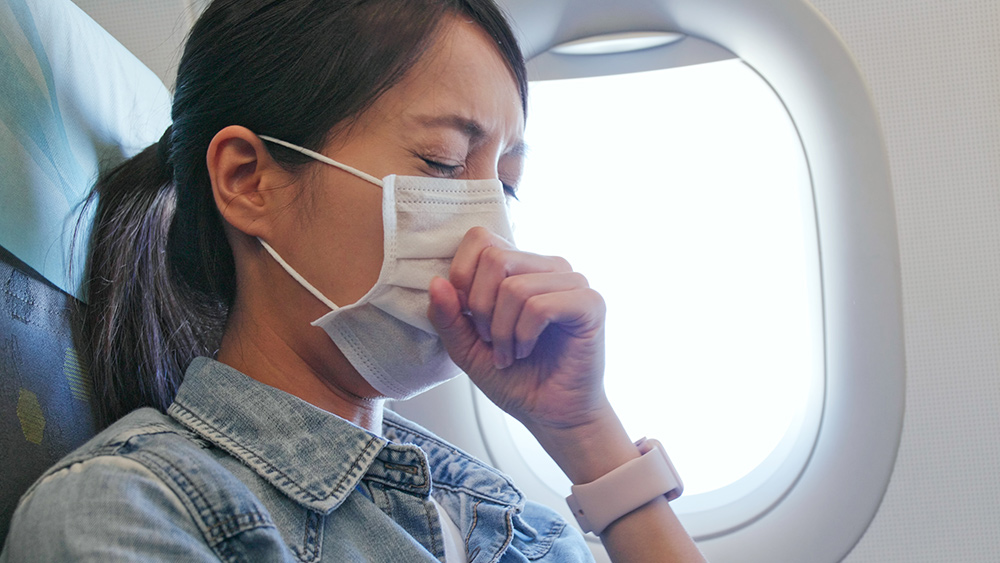Feeling out of breath, even when lying down? Here are 5 reasons
03/11/2020 / By Darnel Fernandez

A shortness of breath even if you’re in a sedentary position can mean an underlying symptom of a health problem, often related to heart or lung disease. If you’re experiencing shortness of breath when lying down flat on your back, and feeling relief when sitting upright or standing, you may have what is called orthopnea.
What is orthopnea?
Rather than a condition, orthopnea is considered as a symptom. The medical term for shortness of breath is dyspnea. Orthopnea is a type of dyspnea that is triggered within a minute or so after lying down. Conversely, when the person sits upright or elevates his head slightly, the dyspnea typically resolves quickly.
People often associate orthopnea with a sensation of tightness in the chest that makes breathing uncomfortable and even extremely difficult. Others also experience occasional chest pain, coughing or wheezing. Because of these symptoms, people suffering from orthopnea prop themselves up with an extra pillow or two in order to get some rest.
Orthopnea can be caused by various reasons, ranging from heart disease to mental health problems.
Obesity
According to the Centers for Disease Control and Prevention (CDC), obesity affects about 93.3 million American adults. People who are overweight might find it difficult to breathe when they’re lying down because of the compressive effects of their weight on their abdomen. In addition to orthopnea, excessive weight is a risk factor for chronic health conditions like heart disease, diabetes and stroke.
Losing weight through regular exercise and a balanced diet is, by far, one of the best ways to ease orthopnea. The diet should consist of plenty of fruits and vegetables, whole grains and healthy protein sources.
Anxiety or panic disorder
A person can experience panic and anxiety attacks at any time, and it can be an extremely stressful experience. While these episodes don’t fall into the typical orthopnea symptoms, they can cause shortness of breath when lying down. You can help ease your anxiety by undergoing treatments like counseling and cognitive behavioral therapy.
Obstructive sleep apnea
Obstructive sleep apnea (OSA) is a type of sleep disorder that makes it difficult to breathe while sleeping. It is caused when the person’s tongue falls back onto the soft palate, which then falls against the back of the throat and closing off the only potential airway. OSA often leads to snoring and even breath pausing. (Related: A majority of Americans with sleep apnea are unaware they have it.)
Heart failure
Heart failure is one of the common causes of orthopnea. In this case, the heart has trouble pumping blood to the rest of the body, which increases pressure in the blood vessels. This increased pressure can cause fluids to leak into the lungs, abdomen and even legs. Heart failure can also lead to fatigue, dyspnea and leg swelling – which makes mundane, everyday activities like walking and climbing stairs more difficult than they should be.
While there is currently no cure for heart failure, you can manage its symptoms by making proper and healthy lifestyle changes, such as eating nutritious, heart-healthy foods and performing moderate physical activity regularly.
Emphysema
Emphysema is one of the most common forms of chronic obstructive pulmonary disease (COPD). This condition refers to a progressive disease that causes damage to the air sacs or alveoli in the lungs. It also makes the breathing tubes narrower, making it significantly more difficult to breathe.
Smoking is responsible for a majority of emphysema cases. However, secondhand smoke and bad air quality can also contribute to the development of emphysema, although to a much lesser degree. Because of this, one of the best ways to prevent the onset of emphysema is by quitting smoking before the damage gets any worse.
The difficulty of breathing caused by orthopnea can easily be circumvented if you are aware of what causes it in the first place. Learn more about respiratory problems at Health.news.
Sources include:
Tagged Under: Anxiety, breathing, chronic obstructive pulmonary disease, cognitive behavioral therapy, Emphysema, heart failure, heart health, obesity, obstructive sleep apnea, orthopnea, panic attacks, prevention, respiratory health, stopsmoking



















